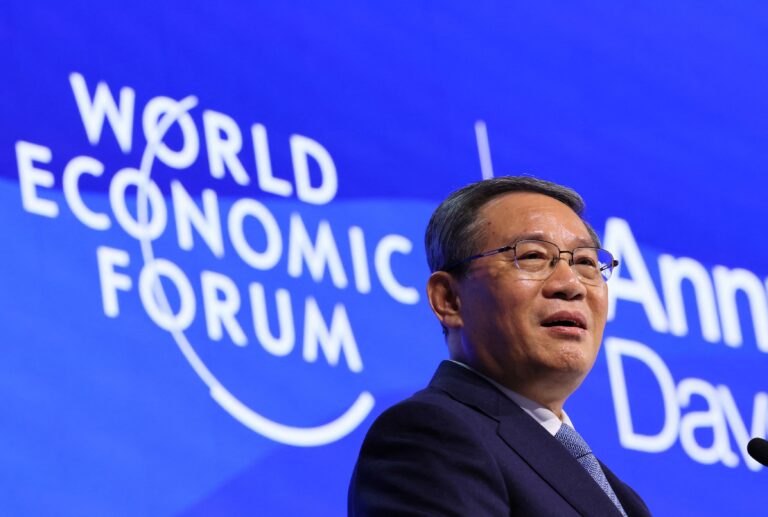Chinese Premier Li Qiang delivered a speech at the 54th Annual Meeting of the World Economic Forum in Davos, Switzerland on January 16, 2024.
Dennis Baribouz | Reuters
DALIAN, China — Chinese Premier Li Qiang on Tuesday defended the country’s technological development even as he criticized efforts to restrict international cooperation.
His comments came at the opening ceremony of the World Economic Forum’s Summer Davos conference in Dalian, China, amid rising tensions with the EU over the import of Chinese-made electric vehicles.
“The rapid development of China’s emerging industries is rooted in our country’s unique comparative advantages,” Li said, via an official English translation of his Chinese-language remarks.
He pointed to the country’s large market, industrial network, workforce, diverse application scenarios and receptive consumers.
“That’s how China’s emerging industries gain competitiveness,” Li said.
Earlier this month, the EU announced plans for tariffs on imports of Chinese-made electric vehicles, and the United States has said it will raise tariffs on the cars to 100%.
China and the EU have reportedly agreed to hold talks about potential tariffs.
“In many ways, the depth of international cooperation determines the height of human development, so it is essential that we embrace each other with open arms,” Li said, noting the need to “reject” confrontation.
Following PM Lee, Polish President Andrzej Duda and Vietnamese Prime Minister Pham Minh Chinh also spoke.
The Chinese premier held state-level talks with the two leaders in China ahead of the “Summer Davos” forum. During his meeting with Duda, Premier Li said China hopes the EU can view China’s development objectively and create a fair market, according to state media. Poland is a member state of the EU.
In a speech at the forum’s annual conference in Davos, Switzerland, in January, Prime Minister Li said technological innovation should not be used as a means to restrict other countries.
The Chinese government has repeatedly called on the United States to remove restrictions that prevent Chinese companies from buying advanced technology from American companies.
Premier Li Keqiang said on Tuesday that China’s economic growth would remain “stable” in the second quarter and that he was “confident” the country had the “ability” to achieve this year’s official growth target of 5 percent.
China said earlier this month that retail sales rose 3.7% in May from a year earlier, beating expectations, but industrial activity grew less than expected. The real estate sector remains a drag on the economy, but exports are holding up as a driver of growth, the data showed.
Asked on stage by World Economic Forum founder Klaus Schwab about China’s economic policies, Premier Li used traditional Chinese medicine and boxing as examples to explain why Beijing is pursuing a more targeted, piecemeal integration approach.
“Over the past few years, we have taken many steps [economic] “China’s roots are healthy,” Li said, noting Beijing’s efforts to support innovation and business.
He said China is stepping up support for its aging society, which he hopes will be a new driver of growth. He did not elaborate on other efforts to boost consumption beyond the previously announced trade-in policy.

